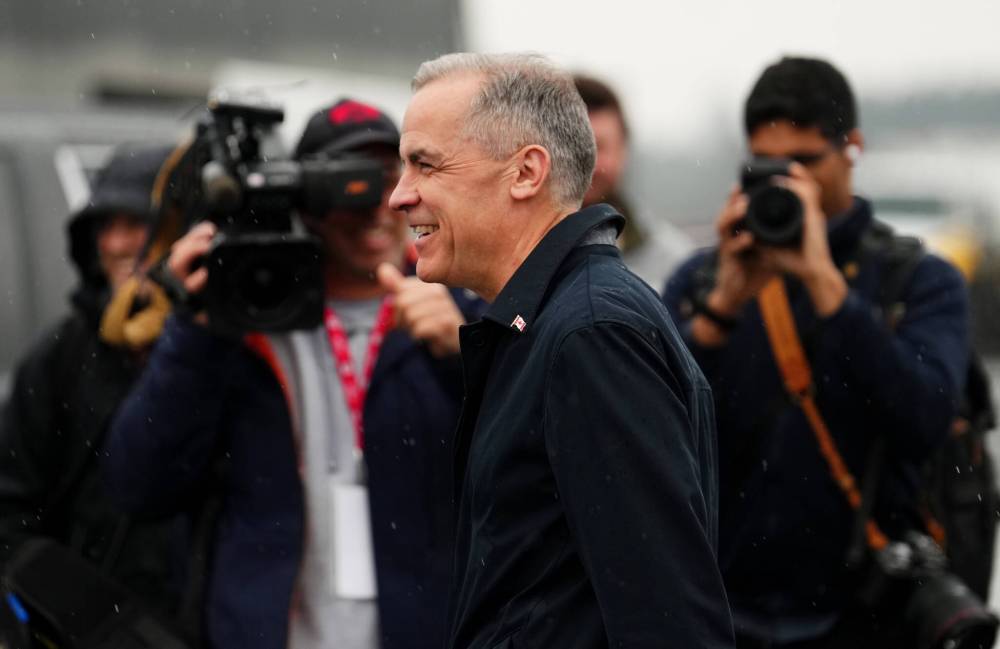Mark Carney in the political crosshairs
Advertisement
Read this article for free:
or
Already have an account? Log in here »
To continue reading, please subscribe:
Monthly Digital Subscription
$0 for the first 4 weeks*
- Enjoy unlimited reading on winnipegfreepress.com
- Read the E-Edition, our digital replica newspaper
- Access News Break, our award-winning app
- Play interactive puzzles
*No charge for 4 weeks then price increases to the regular rate of $19.00 plus GST every four weeks. Offer available to new and qualified returning subscribers only. Cancel any time.
Monthly Digital Subscription
$4.75/week*
- Enjoy unlimited reading on winnipegfreepress.com
- Read the E-Edition, our digital replica newspaper
- Access News Break, our award-winning app
- Play interactive puzzles
*Billed as $19 plus GST every four weeks. Cancel any time.
To continue reading, please subscribe:
Add Free Press access to your Brandon Sun subscription for only an additional
$1 for the first 4 weeks*
*Your next subscription payment will increase by $1.00 and you will be charged $16.99 plus GST for four weeks. After four weeks, your payment will increase to $23.99 plus GST every four weeks.
Read unlimited articles for free today:
or
Already have an account? Log in here »
Hey there, time traveller!
This article was published 15/04/2025 (223 days ago), so information in it may no longer be current.
The only two leaders’ debates scheduled for the current federal election campaign will occur this week, with the French-language debate tomorrow and the English-language debate on Thursday. The leaders of the Bloc Québécois, Conservative Party of Canada, Green Party of Canada, Liberal Party of Canada and New Democratic Party will participate in each of the events.
“Participate” may not be the correct word in the circumstances. The debates are more likely to resemble a four-on-one brawl, or attempted mugging, with Liberal Leader Mark Carney the target of the other party leaders’ attacks.
The basis for that likelihood is obvious. Carney’s Liberals hold a solid and stable lead in countrywide opinion polls and are currently favoured to win a majority of seats in the House of Commons on election day. In Quebec, a number of polls have them leading the Bloc by 20 points or more, meaning that the Liberals are poised to take a number of seats currently held by Bloc MPs.

Sean Kilpatrick / The Canadian Press
Liberal Leader Mark Carney, show here in Victoria, B.C., during a campaign stop on April 6, is getting a quick education in Canadian politics. But is it enough?
A series of national polls have also shown that support for the NDP has collapsed to single digits. If that trend unfolds on election day, the party will likely lose its official party status, and Leader Jagmeet Singh could lose his seat.
For Pierre Poilievre’s Conservatives, who held what appeared to be an insurmountable 25-point lead in national polls just three months ago, the debates represent the party’s final opportunity to reverse the Liberal momentum and restore its hopes of winning the election.
The situation facing the Green Party is similar to that facing the NDP. Support has evaporated as centrist and left-of-centre voters have shifted their choice to the Carney Liberals.
For the Bloc, NDP and Greens, the Liberal surge has created existential crises that can only be averted by reversing that surge, and the debates represent the three parties’ best, and likely final, opportunity to accomplish that objective.
The Conservatives are not at risk of extinction, but are in danger of fumbling what appeared just weeks ago to be a guaranteed landslide victory. A loss to the Liberals would mean yet another four years in opposition, and would likely trigger a visceral divide within the Tory party, along with the genuine possibility that Poilievre could be tossed as party leader.
All of that can be avoided by knocking the Liberals off their perch atop the polls, but how do the four parties accomplish that goal?
They focus their attacks on Carney’s inexperience in politics. They emphasize the amount of time he has spent away from Canada and suggest he is unfamiliar with the many challenges that ordinary Canadians are experiencing. They focus on his personal wealth, and the wealth of the people he has been working with, in order to suggest he isn’t experiencing, and doesn’t understand, the affordability crisis that is hurting many Canadian families.
In other words, the four leaders could hammer Carney with accusations that he isn’t “one of us,” neither understands nor cares about the struggles of everyday Canadians, and (echoing an attack that was effective against former Liberal leader Michael Ignatieff) that he is really “just visiting.”
How does Carney respond to such a strategy? He must demonstrate that he does understand and care about the issues that ordinary Canadians are facing, and must clearly articulate — in both official languages — solutions that will improve their lives.
Beyond that, he must pivot the focus of the debate to the issue that polls indicate the majority of Canadians are concerned about: the existential threat posed to Canada by the Trump administration.
Carney must make clear that he is the only party leader who possesses the background, professional experience and determination that is needed to protect Canada from the erratic, dangerous actions of Donald Trump. He must convince viewers that he has a viable plan to make Canada safer, stronger and more prosperous, and that he has what it takes to make that plan a reality.
Though Carney lacks the political experience that the other party leaders possess, he has shown himself to be a quick learner who does not repeat his mistakes. This week’s debates will be his first experience in such a combative, high-stakes environment, however.
We will soon know if he is up to the challenge.
Deveryn Ross is a political commentator living in Brandon. deverynrossletters@gmail.com X: @deverynross

















